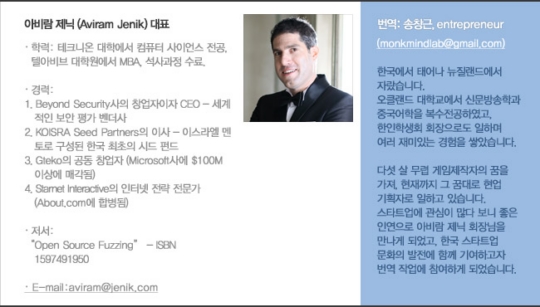`Taklhes`의 사전적 의미는 `요점을 말하는 것`입니다. 모셰 다얀(Moshe Dayan)이라는 유명한 이스라엘 장군은 규모가 큰 집회를 열 때 발언자들에게 "결론만 말하라"고 말하곤 했었는데요, 이 말인 즉, `배경을 설명하지 말고 바로 요점으로 넘어가라`는 의미였습니다. `Takhles`라는 단어를 설명해주는 아주 좋은 예제이지요.
보통의 이스라엘 사람이라면 `Takhles`을 선호합니다. 그렇기 때문에 이들은 영어나 한국어로 말할 때보다 히브리어로 대화할 때 좀 더 직설적이게 되지요(일각에서는 `격식을 덜 차린 말투`라 부르기도 합니다). 히브리어 사용자는 이렇게 생각합니다: 할 말이 있으면 그냥 하면 되지, 어째서 멋진 단어로 포장하는가?
이 단어에는 프레젠테이션의 방식 자체는 그 내용보다 중요하지 않다는 의미도 있습니다. 한국에서 카페를 가보면 메뉴판의 사진에서처럼 실제로 나오는 음료/음식을 보기 좋게 만들어 내는 데 상당한 신경을 쓰고 있다고 느껴집니다. 외형이 가장 중요한 부분인 것처럼 보일 때가 많지요. 허나 이스라엘인들은 잘 꾸며져 나온 음식을 볼 때, 곧 품질이 낮을 것이라는 의심을 가지기 마련입니다.
음식의 외형에 대해 많은 노력과 고려를 했다면 그만큼 맛에 대한 부분을 잃지 않았을까라는 생각이지요. 이스라엘인들이라면 연식이 오래된 빌딩에 있는, 지극히 평범해 보이는 레스토랑에서 기본 플라스틱 접시에 내주는 그런 음식들을 줄서서 기다리고 먹는 식입니다.
이런 레스토랑이 인기가 있는 이유는 맛이 훌륭하기 때문이지요. 음식 맛이 좋다면, 레스토랑 자체의 데코레이션이나 식기의 품질은 중요하지 않습니다. 오히려 레스토랑의 오너가 `Takhles`에 포커싱을 맞추기로 했다는 사실이 암묵적으로 받아들여지는 겁니다. 다른 어떤 것보다도 음식의 맛에 대해 말이지요(손님들이 이 레스토랑을 찾는 이유이기도 하구요).
이스라엘 스타트업들은 `Takhles` 접근법에 능통합니다. 그 어떤 이스라엘 스타트업과 이야기를 해보아도, 제품을 만들고 투자자를 모으며 유저베이스를 늘리는데 집중되어있지, 그 외의 자질구레한 일들, 이를테면 직위나 직함을 부여한다거나 훌륭한 사무실 환경을 조성한다거나 명함 디자인에 있어 창조적인 아이디어를 넣는 일들을 중요하게 생각하지 않는 모습을 볼 수 있습니다.
스타트업을 키우는 데 중요하지 않은 일들은 보통 밀려나거나 의도적으로 무시되곤 하지요. 바로 이 것이 이스라엘 스타트업들로 하여금 굉장히 효율적이면서 적은 일로도 많은 것들을 해낼 수 있도록 만들어 줍니다. 또한 똑똑한 투자자들이 투자의 대상으로서 탐낼만한 부분으로 작용하기도 하지요.
식당은 낡았지만 음식이 맛있기에 그 곳을 방문하는 미식가 마냥, 똑똑한 투자자들은 투자의 대상이 되는 회사가 비록 사무실을 예쁘게 꾸며놓지 않았고 비즈니스카드가 지극히 평범하더라도 그 회사가 제대로 일을 하고 있다 알아차립니다. 사실 이는 투자자로 하여금 이 스타트업이 무엇이 중요하고 무엇이 중요하지 않은 지 알고 있다는 신호가 되기도 합니다. 투자자는 `Takhles`를 원하고, 그런 부분을 보유한 듯 보이는 스타트업을 알아볼 것입니다.
후츠파처럼, `Takhles`라는 단어의 개념 또한 한국어로 정확히 옮기기는 어렵습니다. 한국에서는 본질만큼 외형 또한 중요하지요. 제품의 외형에 신경쓰지 않는다면 국내의 투자자 또는 파트너로부터 알맹이가 없을 것이란 인식을 가지게 만들 위험이 있습니다.
한국 스타트업이 보통의 기업 문화에 비해 격식을 차리지 않는 편이라 하더라도, 국내에서 좋지 않게 평가 받지 않고서야 100% `Takhles`가 될 수는 없을 겁니다. 따라서 한국인에게 고유한 `Takhles`을 만들어 제품의 본질에 집중하는 것과 외형에 신경 쓰는 것 사이를 조율할 필요가 있습니다. 사실 이 부분은 한국이 이스라엘의 스타트업을 넘어서는 강점이기도 하구요. 그 누군들 훌륭한 음식과 함께 멋진 데코로 꾸며진 레스토랑에서 식사하고 싶지 않아하겠습니까?
Entrepreneur`s Hebrew word of the week: Taklhes
Korean entrepreneurs hear a lot about the Hebrew word “Chutzpah”. But this time I want to mention a different word that may be less famous, but is just as good for describing the Israeli entrepreneur characteristics: “Takhles”.
The dictionary meaning of “Takhles” can be best described as `to get to the point`. A famous Israeli general by the name of Moshe Dayan used to start large meetings by telling the speaker: “start from the end”. In other words: don`t give me the background, just jump directly to the point. This is one very good description of “Takhles”.
Israelis in general are big fans of “Takhles”. It is one of the reasons the way of speaking in Hebrew is much more direct (some would say, less polite) than English and of course Korean. A Hebrew speaker thinks: if you need to say something, just say it ? why wrap it in nice words?
Another aspect of “Takhles” is the idea that presentation is not as important as substance. Korean Cafe`s take great care in making sure the items they are selling look as good as the pictures on the menu, and often it seems that the appearance is the first priority. For Israelis, a plate of food that is presented so well is immediately suspected to be low quality. The rationale is that if the restaurant put so much work and thought into the appearance, they may have neglected the taste.
To demonstrate this point, Israelis will line up in front of old buildings to eat at a plain-looking restaurant that may often serve food on basic plastic plates. The reason such restaurants are an attraction is the excellent taste of the dishes; if the food tastes great, the restaurant decor and the quality of the silverware are of no importance. On the contrary ? there is a silent appreciation of the fact the owner decided to focus on the “Takhles”: on the taste of the food (which is why we eat out in the first place) and has not spent effort on the less important things.
Israeli startups have mastered the “Takhles” approach. When talking to Israeli startups you will see how focused they are on building a product, getting investors, and increasing the user base, and how little importance they give to peripheral things like assigning roles and titles, finding beautiful office space or thinking up creative ideas for business card designs. Activities that are not absolutely important for growing the startup are often tossed aside or intentionally neglected; this makes the Israeli startups very efficient and gives them the capability to do more with less.
It also makes them attractive to a smart investor: just like a food expert who goes to a run-down restaurant but knows the food is great, a smart investor will realize that the company has figured out the right things, even if their offices are not beautiful or their business cards are plain and unimaginative.
In fact, this is sometimes a strong signal to an investor that this startup knows what is important and what is not; the investor wants success ? not an appearance of success. The investor wants “Takhles” and will appreciate startups who look like they have that figured out.
Like the idea of “Chutzpah”, the notion of “Takhles” will be hard to implement in Korea; substance is important in Korea, but appearance is important too. By not caring about appearance you run the risk of local investors and partners thinking you have no substance, either. And although the Korean startup culture is much more informal than the regular business culture, you will not be 100% “Takhles” without being labeled badly in Korea.
Korean startups therefore need their own version of “Takhles” which is a compromise between a strong focus on substance, with some degree of attention to appearance. In fact, this could be a strong point of Korean startups over Israeli startups. Who doesn`t want to eat in a restaurant that has great food but also has pretty decor?

관련뉴스














